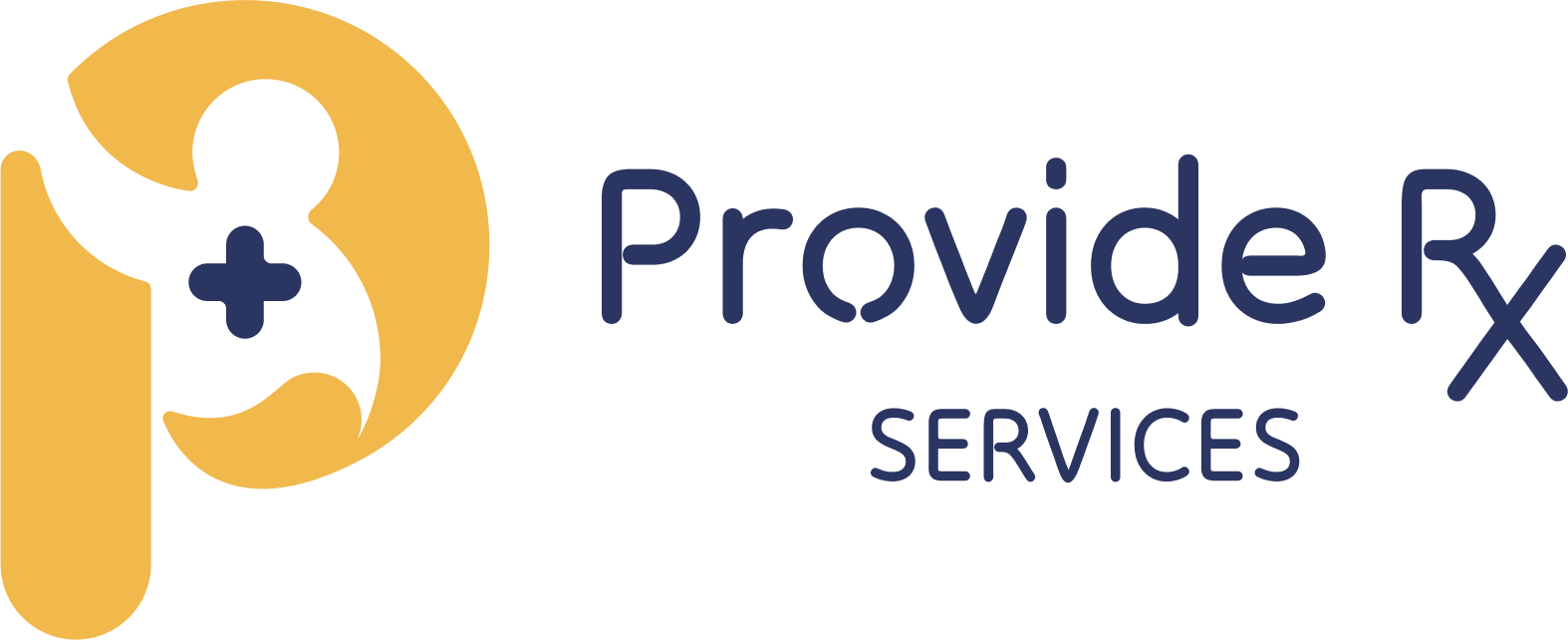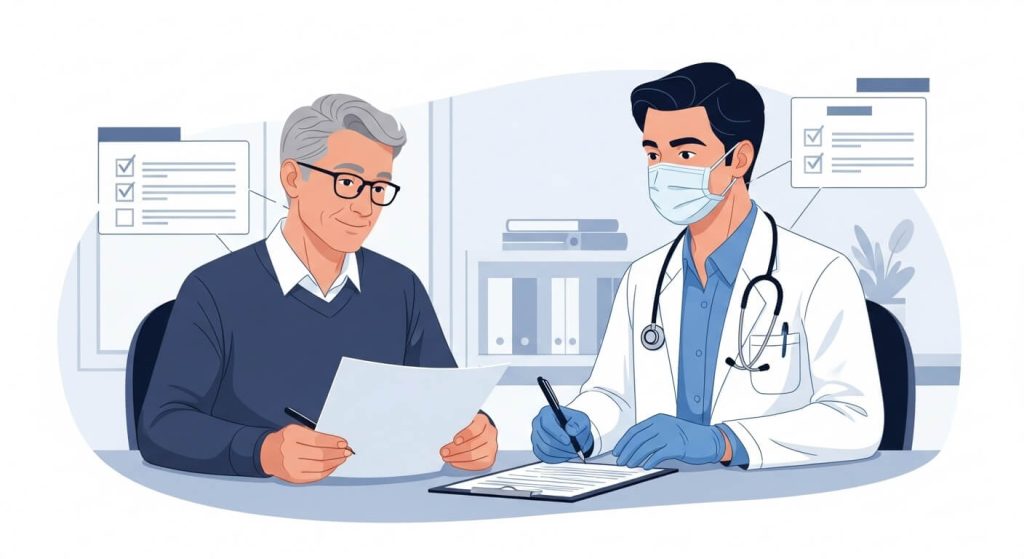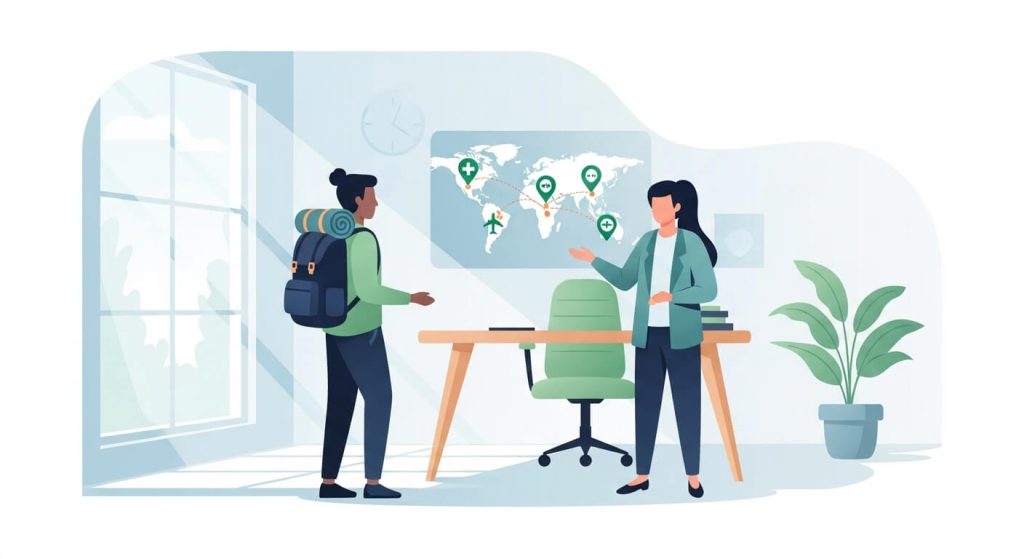A Certified Medical Tourism Professional is a trained specialist who helps patients navigate international healthcare systems, coordinate travel, understand medical documentation, and oversee logistics around complex medical procedures performed outside the U.S. Their certification signals expertise in global healthcare, patient safety, cultural communication, and risk reduction.
However, while a Certified Medical Tourism Professional adds tremendous value for travelers seeking surgeries or medical interventions abroad, most U.S. adults who simply need access to their prescribed medications — especially high-cost treatments like biologics — rarely require this level of support. For these travelers, a guided visit to a licensed international pharmacy is usually all they need.

Understanding the Role of a Certified Medical Tourism Professional
A Certified Medical Tourism Professional (CMTP) receives advanced training in the principles of cross-border healthcare. Their responsibilities often include:
Cross-border regulatory guidance
They help patients understand the healthcare standards of other countries, including documentation, best practices, and international expectations of safety.
Travel and care coordination
They organize long, multi-step medical journeys that may involve pre-operative testing, appointments with specialists, and recovery planning.
Bridging communication gaps
A CMTP may help patients interpret medical recommendations or communicate with international clinics.
Ensuring patient safety
They are trained to recognize risk factors and help patients choose internationally accredited providers.
This profile fits travelers who need surgical, diagnostic, or invasive care abroad — not people whose trip revolves around purchasing prescribed medications at licensed pharmacies.
When a Certified Medical Tourism Professional Is Truly Needed
Complex medical travel requires expertise. Patients undergoing treatments such as orthopedic surgeries, cancer procedures, dental rehabilitation, cardiac operations, or fertility treatments often rely on certified specialists who can coordinate everything from provider selection to follow-up protocols.
These cases benefit from deep coordination, multi-provider oversight, and bilingual support. Travelers must understand detailed clinical information and make major decisions — areas where certification is extremely valuable.
But this should not be confused with straightforward medication travel, which follows a very different pattern.

Why Most U.S. Medication Travelers Don’t Need a Certified Medical Tourism Professional
For U.S. adults 35–65 managing chronic conditions with medications like Humira, Taltz, Stelara or Enbrel, the intention isn’t full medical treatment abroad — it’s affordability. They already have a valid prescription from their U.S. provider. What they need is clarity, safety, and reliable guidance as they travel to purchase their medication from a licensed international pharmacy.
This experience is fundamentally simpler than medical tourism for procedures. It doesn’t require clinical oversight, international care coordination, or certified facilitation. Instead, it revolves around secure travel planning, pharmacy verification, and ensuring the patient feels supported and protected.
Many travelers researching options come across resources like the World Health Organization’s guidelines on quality and safety, which help them understand global healthcare practices without implying the need for a Certified Medical Tourism Professional for pharmacy-only travel.
A Certified Medical Tourism Professional is a trained expert who coordinates medical travel for procedures performed abroad. Their guidance is crucial for complex care, but often unnecessary for U.S. patients traveling only to buy prescribed medications from licensed pharmacies in Mexico.
Medication Travel to Mexico: A Much Simpler Path
Medication travel — especially to Tijuana — is one of the most straightforward forms of cross-border healthcare. There is no surgery, no hospital stay, and no multi-step medical evaluation. Travelers simply need reliable support to:
- move safely across the border
- verify the licensed pharmacy
- complete their purchase
- return home with confidence
Many Americans discover meaningful savings on their medication — sometimes a significant percentage — by making a simple same-day trip. Several readers exploring this topic also end up reviewing content like Pharmacies in Tijuana Mexico, which provides a clearer understanding of how these pharmacy visits actually work.
How Guided Pharmacy Visits Replace the Need for a Certified Medical Tourism Professional
A guided pharmacy experience focuses entirely on logistical clarity, not medical decision-making. The traveler already knows what they need — their prescribed medication — and only requires help navigating the practical aspects of obtaining it safely abroad.
This support might include transportation, document review, border coordination, and a secure meet-and-assist process. But it does not require the role of a Certified Medical Tourism Professional.
Readers researching broader travel patterns often explore topics like medical tourism in Mexico or deeper comparisons, such as Medical Tourism Mexico, which reinforces why pharmacy-only travel fits into its own category.
Why Many Americans Choose Tijuana for Affordable Medications
Tijuana remains one of the most convenient destinations for U.S. travelers. It’s close to major airports, has predictable travel routes, and is home to multiple licensed pharmacies that follow regulatory standards.
Medication savings — especially for biologics — can be substantial, making Tijuana a practical choice for adults seeking alternatives to high U.S. prices. Some travelers also review specific medication assistance information, like Stelara Assistance Mexico, to understand how specialty drugs are accessed internationally.
Building Confidence Through Transparent, Ethical Guidance
Medication travel should always feel structured and predictable. Many travelers want reassurance — but not unnecessary layers. They look for U.S.-based guidance that emphasizes safety, clarity, and simplicity, while respecting their autonomy and staying within the boundaries of their existing prescription.
For travelers who want to understand global safety principles, resources from the World Health Organization offer helpful context. For example, the WHO’s overview on international healthcare quality provides a clear picture of how cross-border standards operate and why pharmacy-only travel is far less complex than full medical care abroad.
You can read it here:World Health Organization — Quality of Care
Conclusion: A Certified Medical Tourism Professional Isn’t Always Needed — And That’s Positive for Medication Travelers
A Certified Medical Tourism Professional plays a vital role in global healthcare, supporting patients undergoing complex international treatments. But for U.S. adults traveling only to purchase their prescribed medications, this level of expertise isn’t typically necessary.
Instead, a guided pharmacy visit offers everything they need: structure, safety, clarity, and a straightforward path to meaningful savings.
How to Get Safe, Clear Guidance for Medication Travel
If you’re exploring the possibility of traveling to Mexico to purchase your prescribed medication, a reliable U.S.-based concierge team can help you understand the process, prepare documents, and accompany you during your visit to a licensed pharmacy in Tijuana — without requiring full medical facilitation services.
Reach out today for clear, pressure-free information tailored to your situation.




